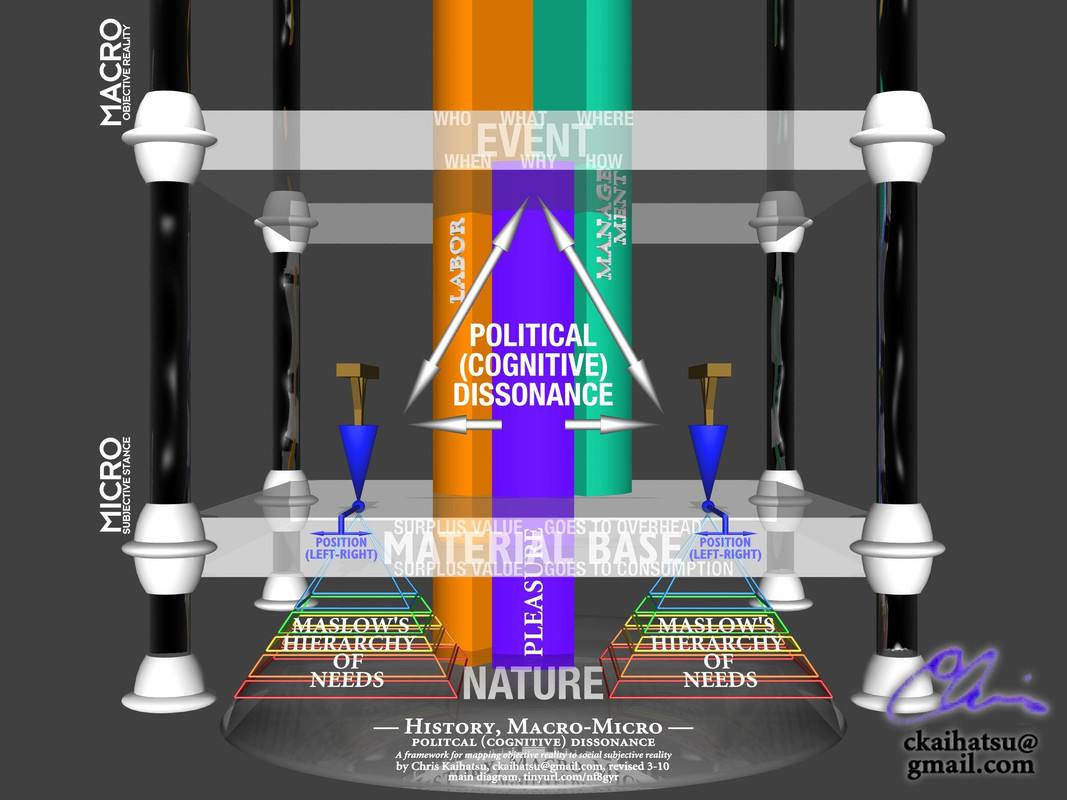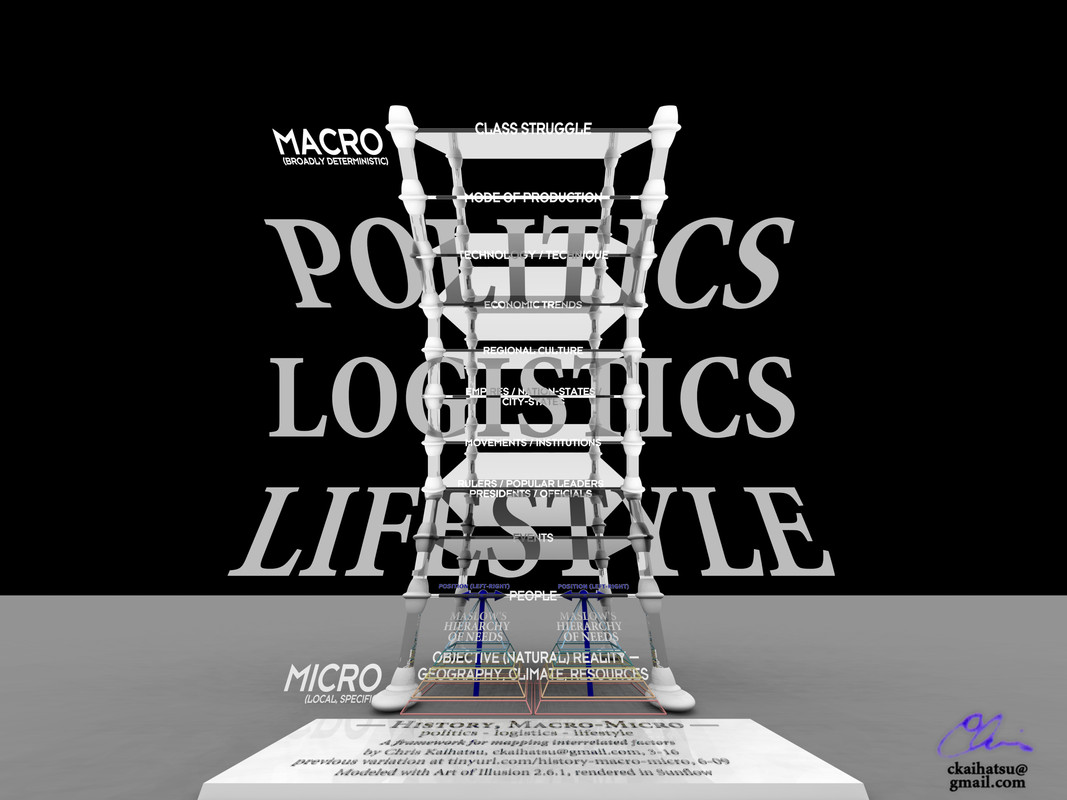Unthinking Majority wrote:
So if there's 10 people on your team and 9 are working hard, and you want to work half-assed, the cost to society is low, but your personal gains are high (less work to do, can relax a bit, chat with friends, text your bestie).
ckaihatsu wrote:
There would be no salaries or wages because labor would no longer be commodified.
Consider as being similar to PoFo here -- either the effort for discussion, etc., is put-in by participants here, or else it *isn't*. Likewise there could be an *identical* social process for a *post-capitalist* political economy, one in which discussions like these would actually apply to specific *real world* production processes.
Unthinking Majority wrote:
We all voluntarily post on PoFo because it's interesting and we enjoy it, and would prefer to do it than any other fun/enjoyable potential activity in the room/place you're in right now.
Whoa -- knee-jerk *defensive* there.
Back to the topic, my point stands that, *overall*, it really *doesn't matter* if people are hard workers or not, post-capitalism -- it's just that, on-the-whole, either there's a 'critical mass' of uncoerced liberated labor participation for the whole *society* to have good modern lifestyles, or else it won't, and more people *should* participate with their work efforts.
Unthinking Majority wrote:
Find me some people who would prefer to clean toilets or snap plastic parts together for 8 hours a day, 40 hours a week than to sit at home and play Xbox or go out and party with friends.
Wilde *agrees* with you:
And as I have mentioned the word labour, I cannot help saying that a great deal of nonsense is being written and talked nowadays about the dignity of manual labour. There is nothing necessarily dignified about manual labour at all, and most of it is absolutely degrading. It is mentally and morally injurious to man to do anything in which he does not find pleasure, and many forms of labour are quite pleasureless activities, and should be regarded as such. To sweep a slushy crossing for eight hours, on a day when the east wind is blowing is a disgusting occupation. To sweep it with mental, moral, or physical dignity seems to me to be impossible. To sweep it with joy would be appalling. Man is made for something better than disturbing dirt. All work of that kind should be done by a machine.
https://www.marxists.org/reference/arch ... /soul-man/
---
ckaihatsu wrote:
Since it would be inhumane to deny 'commons' and natural materials to anyone (that which is mass-produced by anyone and/or nature) -- *and* there would be no government for any 'oversight' and 'enforcement' -- then that means that *anyone* could simply live off of society and/or nature without doing a single minute of work in return, and no one could do anything about it, ultimately.
Unthinking Majority wrote:
This is true insanity and completely lacking in logic. No government? What do you do about the bad actors who get jealous at the guy who their girlfriend winks at and then sticks a knife in him?
Well, what's being done about it today?
There's *nothing* that anyone, under *any* kind of socio-political order, can do about impetuous / spontaneous 'crimes of passion' because they happen instantaneously, without warning. Such isn't really *political*, anyway, and so there's no obligation for any kind of *politics* to address it.
Unthinking Majority wrote:
Large diamonds are rare and finite. What do you do about the bad actor who steals a bunch of large diamonds from people in his town and then shows up at a party with 10 rings with large diamonds on them? Did you ever read Animal Farm? lol.
Wow. Boundless pessimism and dark clouds, huh?
Note that all possessions, post-capitalism, would be *personal* property, or else 'the commons', since all *extra*-personal private accumulations would be no more. Sure, people could have diamonds, but they could also *secure* them, and, more to the point, society could produce *synthetic* diamonds, with full automation, to the point that they litter the streets.
Unthinking Majority wrote:
Why is it inhumane for a capable and able-bodied person who simply chooses not to work to be denied a good or service that is produced by the labour of somebody else?
Because what you're describing would require a *government*, and then there would be *specialized* administrative roles (called 'administrators') who would not actually produce goods or services (formerly 'commodities') for the common good.
Basically you're advocating *Stalinism* here, which requires a *schism* of work roles within the working class / post-capitalist humanity, which would be too problematic because that administration would then necessarily be *detached* and *elitist*, doing administrative stuff.
Unthinking Majority wrote:
Does that mean people are your slave?
Why *would* they be? If capitalism were overthrown tomorrow, I would have no special status because communism is all about *no power*. No class division, no power.
Unthinking Majority wrote:
You can sit on your butt and do nothing, but people are FORCED to work for them for nothing in return? That is tantamount to slavery.
Where would the hypothetical 'force' *come* from, exactly? There's no government. Who's 'them'?
Again, society would be *fully collectivized* -- this means that society would rise and fall as one, because that society would prioritize *human needs*. Do you think that the people of today's world would be sufficiently generous to do *some* work, *some* of the time, for the greater good, post-capitalism?
The worst case, if no one does *anything*, is that everyone would have to *forage*, from nature, for their daily sustenance and other needs.
Unthinking Majority wrote:
If you're a healthy able-bodied adult who refuses to be of any use to yourself or anyone else, and willfully chooses not to contribute to society, you deserve to starve to death.
Moralism. What if that post-capitalist society had enough mass motivation and cooperation to finally implement *full automation* over all of the industrial implements from the era of capitalism -- it would be able to produce an *abundance* of whatever, by merely writing a few lines of code and leveraging AI. *And* the *ethos* of this society is 'production for human need', so the *priority* would be the very person that you're describing, since everyone else wuld be proactively looking after *themselves*.
Again, I would have no special status or exceptional position in a post-capitalist society because there would be *zero* power bases in communism.
Unthinking Majority wrote:
It's not inhumane, that's your willful choice.
Don't you see that the person's own 'life-choices' -- and *your* moralism -- would be entirely *irrelevant* -- ?
Do we talk about people 'not deserving' air or water? These life-necessary materials are *critical* to life itself, at a biological level, so that always comes *first*, with social-moral / -ethical concerns *afterward*.
Anyone who's perpetually inactive, for whatever reason, of course should get whatever they need to *stay alive*, as a prerequisite for whatever it is they decide to do with their lives, if anything. Social life is 'higher-level' than sheer biological *existence*:
:max_bytes(150000):strip_icc():format(webp)/maslow-s-hierarchy-of-needs--scalable-vector-illustration-655400474-5c6a47f246e0fb000165cb0a.jpg)
Also:
History, Macro-Micro -- Political (Cognitive) Dissonance
---
Unthinking Majority wrote:
I have no problem providing for the sick, elderly, children, disabled etc. If you can contribute to society and choose not to, you don't deserve the benefits of its labour.
Moralism over *physical items* would be mostly *moot* in a post-scarcity / abundant society. Sure there would still be 'socio-political' issues within, such as what to do, what to build where, etc., but we wouldn't have to use a *scarcity-based* morality to fuss over this-or-that item, as you're doing right now.
Maybe the social norms of that society *would* regulate many categories of items, and I'm sure you would advocate for that kind of approach, but now we're both just speculating on the particulars.
---
ckaihatsu wrote:
You're *dissembling* here, and not-addressing the point I'm making about *incentive* for the worker -- workers get the short end of the stick, so there's no empirical *incentive* to identify with the boss' interests, and work harder.
It's physically easier to not-work than to *work*, so if work / effort is to be expended, it needs to be rewarded. Workers aren't at the workplace to be *volunteers* and *altruists* to the capitalist ruling class.
Unthinking Majority wrote:
They're awarded by not being fired, and therefore receiving a wage, which allows them to eat and put their family in a decent house. If you have any ambition at all you work hard so that in a few years you can be promoted to supervisor, and be paid a higher wage, then several years later be promoted to manager, and get an even higher wage. Then with that experience possibly move to another senior position at another company, where the wage is even higher and the job is more interesting.
So it's the carrot-and-the-stick, as things are today, correct?
Who gets to select what the carrot will be, and what the stick will be?










:max_bytes(150000):strip_icc():format(webp)/maslow-s-hierarchy-of-needs--scalable-vector-illustration-655400474-5c6a47f246e0fb000165cb0a.jpg)




 - By wat0n
- By wat0n